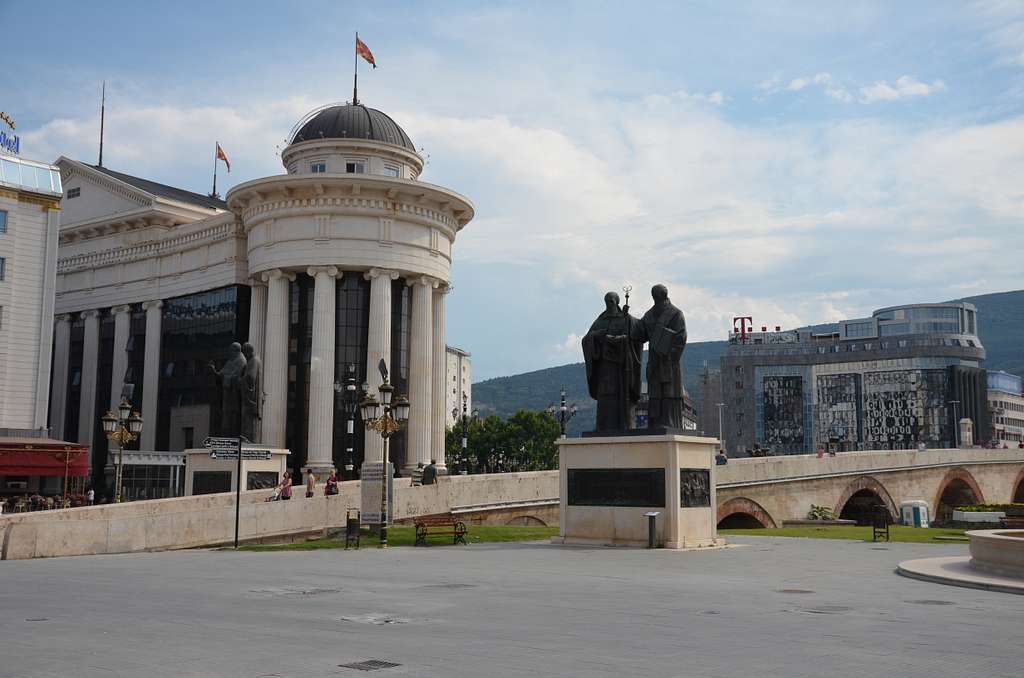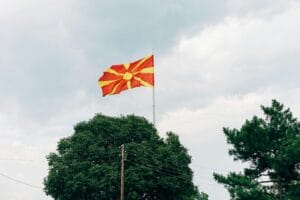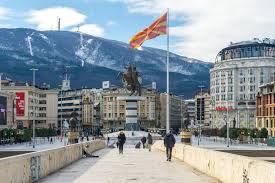Image: Macedonian capital Skopje. Source.
On 8 May, Macedonians go to the polls to elect both a new parliament and a new president. Turnout is likely to be quite low due to general disappointment with and low trust in politics in the country. As was the case during previous elections, the two most prominent parties, SDSM and VMRO-DPMNE, will take central stage. The outcome of these elections could have significant implications for the future prospects of North Macedonia joining the EU.
Presidential elections
The re-run of the presidential elections, held on April 24, takes place alongside the parliamentary vote. Gordana Siljanovska-Davkova of centre-right VMRO-DPMNE will face off against Stevo Pendarovski of social-democratic party SDSM. After scoring a spectacular victory over her rival in the first round, she will head to the re-run with confidence. It was the first time in history that SDSM got less than 200.000 votes, with Gordana Siljanovska-Davkova beating Pendarovski with a bigger vote difference than the total amount of votes for opponent. Even though the office of the President is mostly ceremonial, results of this election are likely indicative of the voting in the parliamentary elections.
2020 parliamentary elections
The previous parliamentary elections took place in July 2020. Then-president Zoran Zaev from SDSM called early elections after France had vetoed setting a date for North Macedonia’s and Albania’s EU membership negotiations. It would further question the likelihood of short-term accession of North Macedonia and dealt a blow to the confidence in the Zaev government.
In the elections, the SDSM led the We Can! More and Better (We Can!) coalition consisted of more than 20 political parties. VMRO-DPMNE led the Renewal for Macedonia coalition, also comprising many other smaller parties. We Can! secured a very close victory, acquiring 35.9% of the votes while Renewal for Macedonia got 34.6%. The difference between the two blocs was much smaller than polls had suggested beforehand, many predicting a more convincing victory for We Can!.
SDSM and its partners were able to forge a coalition with the third-largest Albanian BDI party and Democratic Party of Albanians. Initially, Zaev led the coalition but he stepped down after very disappointing results in local elections in 2021. In hindsight, this can be seen as a precursor to VMRO-DPMNE’s national success as it succeeded to take several key municipalities from SDSM. He was succeeded by Dimitar Kovačevski who was then succeeded by Albanian president as part of an agreement stipulating 100 day rule for an Albanian prime minister.
2024 parliamentary elections and candidates
Like in 2020, the major parties participate in the elections as part of a larger bloc but under different names. SDSM heads the For a European Future coalition with VMRO-DPMNE at helm of the Your Macedonia block. As was the case in previous elections these coalitions consist of a large number of parties including Serbian, Roma and Turkish minority parties as well as splinter parties.
The country is divided into six constituencies that all account for 20 seats in the parliament. 3 additional seats are distributed according to the votes of Macedonians living abroad if the threshold is reached.
EU candidacy
EU accession has been the major political issue in North Macedonia since the country was granted candidate status in 2005. Although support for joining remains high, the slow and frustrating road towards accession talks has significantly increased disillusionment with the EU among Macedonians.
A general slowdown of EU enlargement has been felt not only by North Macedonia but by many aspiring EU nations. North Macedonia faced additional hurdles in the form of opportunistic demands relating to longstanding disputes with its direct neighbours. The power of the EU veto was used by both Greece and Bulgaria to force concessions from the Macedonians. The Greeks disputed the name “Macedonia” and were able to effectively force through a name-change. Bulgaria pushes for a constitutional change recognising a Bulgarian minority in North Macedonia while also advising the EU not to recognise the Macedonian language, instead branding it as a Bulgarian dialect. The veto was eventually lifted, allowing accession negotiations to start in July 2022. The constitutional changes, however, remain a requirement for EU accession.
This has put the ruling SDSM party in a difficult political predicament. They have indicated their willingness to change the constitution but failed to acquire a two-thirds parliamentary majority needed to do so. Meanwhile, VMRO-DPMNE explicitly opposed further constitutional changes. Many Macedonians, perceive the compromise with Greece as unjust and the demands from Bulgaria have only heightened concerns, particularly among conservative factions. The extent to which Macedonian national identity should be sacrificed for EU membership is a key issue in the elections.
VMRO-DPMNE has capitalized on this unease, actively campaigning on a platform of preserving Macedonian identity and resisting foreign demands. This stance has significantly contributed to the party’s popularity, contrasting with the SDSM coalition’s approach of advocating for compliance with Bulgaria’s demands and previously endorsing the name change.
State of the economy and corruption
As much attention was focused on the EU negotiations, domestic concerns have been overlooked. Economic performance has been sluggish for years and the country has experienced a significant brain drain. The bad state of public health care, neglected infrastructure and high employment reflect badly on the SDSM coalition’s capacity to govern.
Corruption has been rampant for years and many high-level public officials have been implicated. A recent EU report indicates that no progress has been made in this area. Generally, Macedonians believe corruption to be widespread in their country, both in the public and private sector. Delays and reversals of corruption trials as well as the reduction of maximum penalties suggests that the judiciary is at the very least grossly ineffective in dealing with the problem. Several corruption scandals surrounding senior SDSM officials have badly tainted the reputation of the party.
The Albanian vote
A quarter of the Macedonian population is ethnically Albanian, making them a political force to reckon with. Whereas the Albanian vote was traditionally concentrated around the largest party Democratic Union for Integration (DUI), a new breakaway coalition has emerged. The Alliance for Albanians, led by Arben Taravari, has received ‘informal support’ from Kosovo’s PM Albin Kurti’s party Vetevendosje and has declared to join the opposition. It could upset Albanian power dynamics that had been in favour of the SDSM in recent years and limit the influence of the Albanian minority as a whole.
Result forecast and implications
Polls consistently indicate a strong lead for VMRO-DPMNE with lead-estimates ranging from 9% up to 20%. The convincing victory by Siljanovska-Davkova supports the prediction that the Your Macedonia coalition is likely to win the elections by a wide margin. They are currently polling at around 40% of the vote which would mean an improvement of about 5% compared to the last elections.
The SDSM is likely to lose significantly. Their pro-European stance has lost much of its appeal in the wake of the long and disappointing road towards EU membership. The For a European Future bloc currently polls around 25% of the vote which would mean they lose about 30% of their voter base.
General disillusionment with the prospects of EU membership, coupled with the current government’s poor track record, has prompted voters to seek alternative options. And, although VMRO-DPMNE has professed support for EU membership it is likely to take a more ‘Macedonia-centred’ course, making no concessions to external demands such as those of Bulgaria. Unless there is a change of heart within the EU, this is likely to negatively affect the likelihood of accession under VMRO-DPMNE rule.



